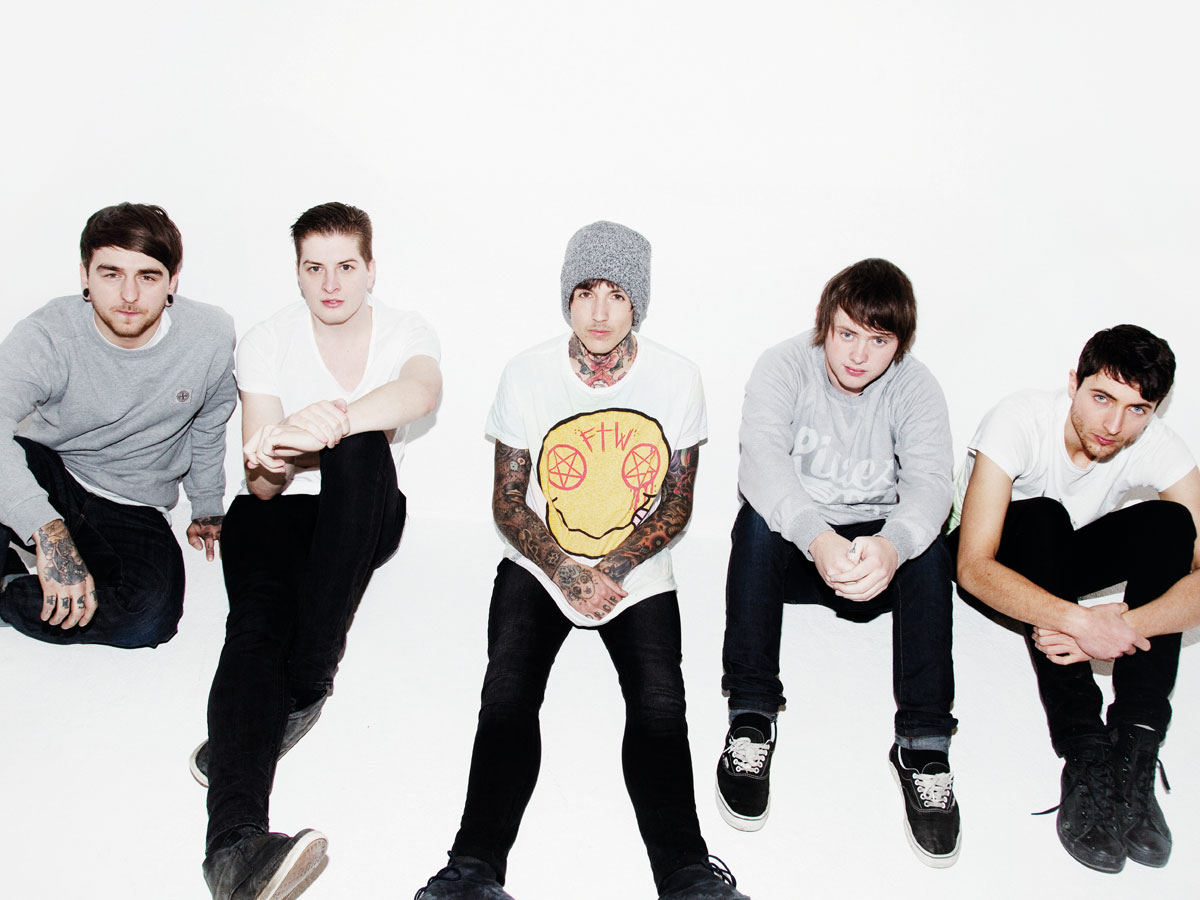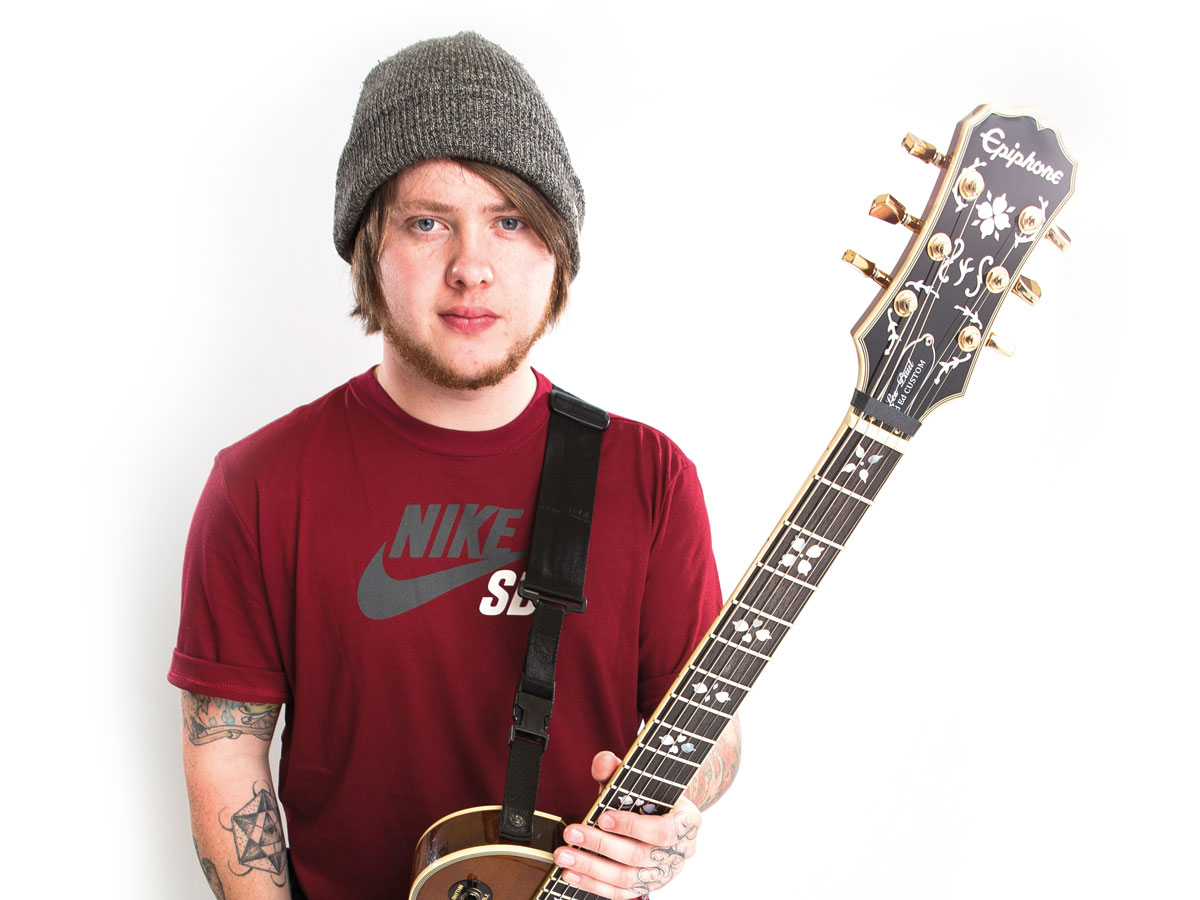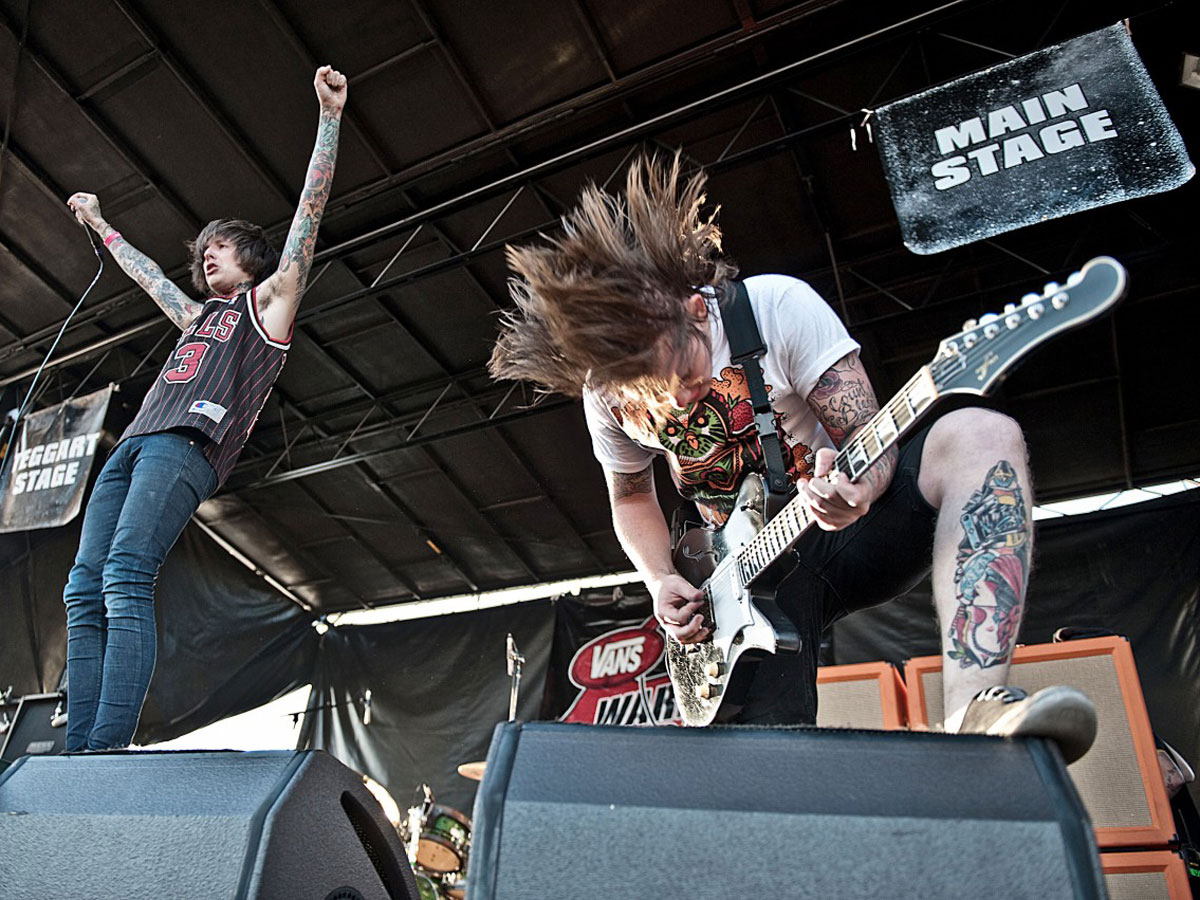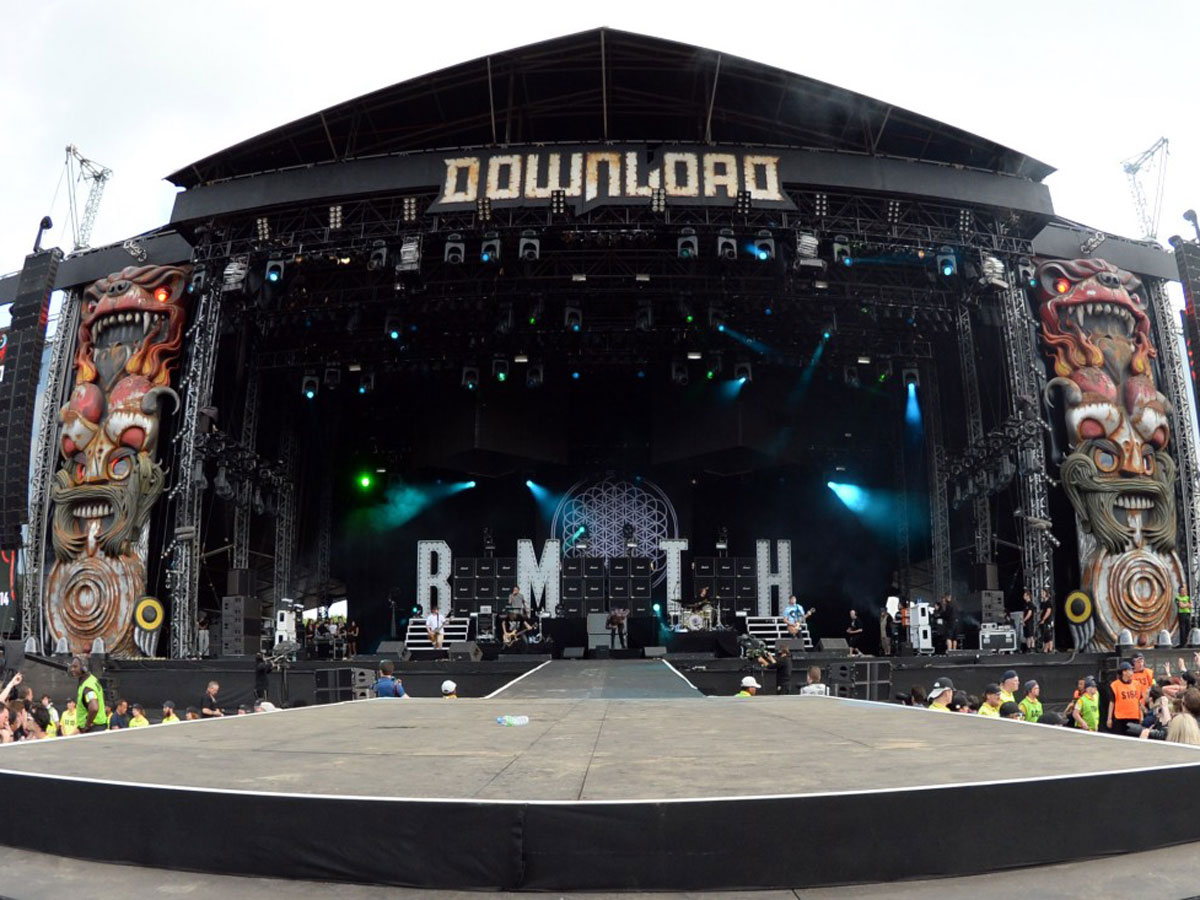Lee Malia talks Wembley, gear and his guitar roots
Bring Me The Horizon guitarist discusses band's rise and, er, rise!

Introduction
Name us a bigger metal band to emerge from the UK in the last 10 years than Bring Me The Horizon and we’ll name you a liar.
We can get into semantics about what does and does not constitute metal - indeed, we do, down the page - but love ’em or lump ’em, in the last decade the Sheffield-bred five-piece have been there, done it, and started the t-shirt brand.
"I was always dead shy as a kid and the last thing on my mind was having people stare at me! I just loved playing guitar”
Guitarist Lee Malia is, as frontman Oli Sykes once put it, “the brains, the technique” behind the Northern rock regents. From the mad metalcore of 2006 debut Count Your Blessings, through to 2010’s acclaimed, post-rock channeling landmark There Is A Hell... and last year’s major label debut Sempiturnal, his growth as a player has matched that of his band.
Now, looking forward to a landmark December show at Wembley Arena and armed with a stunning new Epiphone signature model, we sit down with the man of the moment...
You formed the band 10 years ago. What were your expectations back then?
“When you’re that young you don’t really have expectations. We just wanted to play music. I started going to Sheffield and I saw Hundred Reasons and Sparta, then it was going to Manchester Arena and seeing Slipknot, and I used to go to Monsters Of Rock with my dad, so everything from local gigs to [big festivals].
“I played guitar and I just thought it would be fun to jam. I was always dead shy as a kid and the last thing on my mind was having people stare at me! I just loved playing guitar.”
How did you first start playing guitar?
“My dad used to play a bit and he left an electric guitar in my room, but I was never bothered about it. I asked him to take it out because I didn’t want to break it when I had mates around playing PlayStation. Then, three months after he got rid of the guitar, I got really into music and decided I wanted to play! I remember it was Boxing Day and I had like £80 Christmas money, so I went and bought one from Fox’s Music in Sheffield.”

Changing tastes
Would you say that guitar music was your way of bonding with your dad?
“Yeah, I think when I started enjoying guitar music he was like, ‘Ah, great!’ He started taking me to shows. He’d take me to watch club bands doing covers, or we’d go and watch Gary Moore at the Arena. I think he was trying to influence me with what he thought was good music.
"We saw Gary Moore a couple of times and we were both gutted when he died, because you weren’t expecting it. We’d always had a mutual love for his guitar playing.”
"When I heard Sigur Rós I realised that to be heavy you don’t have to do a ‘chug’. It can be powerful in a different way"
How has your guitar taste changed since the early days of the band?
“A lot. When you’re young, you just want to do everything to extremes. That’s what the first EP and the album [2006’s Count Your Blessings] were like: too over-excited sounding.
"You’d see someone sweep picking and then you’d want to learn that or you’d want to learn pinch harmonic squeals. It was just trying to learn too much, rather than getting good at one thing. Now I feel like I know what my strengths are and I play to them and whatever suits the song.”
Are there any guitarists that people might not expect you to draw influence from?
“I really like Bon Iver, Justin Vernon, and what he does on guitar. It’s such a different genre that it gives me so many more ideas. The cool stuff they do with EBows, when you take that into heavier music, you can use it in a really dark way.
"Then, also, Sigur Rós. That whole side of building sounds up and soundscapes, I took a lot of influence from and I realised that to be heavy you don’t have to do a ‘chug’. It can be powerful in a different way.”

Go-to guitarist
Have you always been the band’s main contributor, in terms of guitars?
“Yeah, since [2008 album] Suicide Season I’ve played all of the guitars on every record. I remember [producer] Fredrik Nordström being like, ‘You should play all of the guitars on the CD.’ We didn’t understand why, because we always did both guitarists before then, but he was like, ‘If you want it to sound good, you do it.’ Everyone went, ‘Alright, fair enough...’
"I got really into standard tuning, but dropped, and it opened up a whole new style of writing"
"So I did it from then on because it seemed to make more sense than trying to teach someone the right phrasing and being like, ‘No, do it again’. From then on, I just fell into the role of doing everything ‘guitars’.”
Third album There Is A Hell... brought in post-rock/indie influences and marked a change in your sound and fortunes. Were you the driving force behind that direction?
“I guess so, because I changed tuning. Suicide Season, a lot of it, was still in drop A#, and there were like two tracks on there where I tuned to Standard C. Then on There Is A Hell... I got really into standard tuning, but dropped, and it opened up a whole new style of writing, because I started using more traditional chord shapes. Changing the tuning changed a lot of what I wrote, because it wasn’t just chugs - you’re not just stuck going over the same four fret patterns.”
How did your pedalboard change to incorporate the new sounds?
“It’s got bigger, but easier in some ways. I’ve got a switching system now, so everything loops into that one pedal and I can press one button and switch my amps and four pedals at the same time.
"It’s still pretty simple: I have a Boss DD-7 Delay, an RV-5 Reverb and then an Electro-Harmonix Cathedral Reverb, which I use for the reverse reverb noises. Then I’ve just got a Tube Screamer on top of my Marshall, because the JCM800 isn’t super-distorted. All of that came in on There Is A Hell... pretty much.”

Evolution
That sound reached full fruition on Sempiternal. Do you feel as though the band transcends metal now?
“I suppose so, because it’s not really a metal CD. It has aspects of metal, but it’s not like we’re trying to be a metal band, or anything else. We just had a go at something we wanted to hear. I think it’s put us in our own little space because we can go and play festivals that don’t have any rock bands on and still go down well.
"All the sub tracks that Jordan [Fish], our keyboard player, does live, I think people that go and watch, say, Prodigy, they love that bass feeling of it, and I guess you’ve got that side of it coming across now.”
"To be playing Wembley Arena and headlining... For a band like us - it’s just crazy"
The band’s other guitarists have both left under acrimonious circumstances. Will you ever bring in a second guitarist again?
“No, I mean, we’ve all talked about it, but none of us really see the point. It works now and we tried using other people and never found somebody that fits. That’s why it’s so weird that we found Jordan and it worked, but it just seems easier. Me, Oli and Jordan all work really well together when writing.
"We’ve got a friend who plays [guitar] live now, and he knows exactly how it is and he’s not bothered. It makes life a lot easier. It’s not as hard in the studio to tell somebody they’re not going to be playing, you know? [laughs]”
Has your choice of backline changed now you’re playing for increasingly big crowds?
“I use Marshall JCM800s for both my clean and distortion now. You can’t really get a Marshall 800 wrong, and everywhere you go they always sound the same - you hear the sound of the guitar more than anything, so that’s why I really like it. They always send us backlines, which is cool and, to me, they always sound the best, so I always go back to them.”
You’re playing Wembley Arena in December, a landmark moment for so many British bands. What makes that show special?
“It’s mental. It’s our 10-year anniversary this year, so that’s one thing. We’ve played there a couple of times, supporting, but to be playing there headlining... For a band like us - it’s just crazy to even be able to play there.”
Finally, in 2013 you said, ‘We’re never gonna sell out arenas. If you get that in your hopes, you’ll be let down.’ Do you still feel the same way?
“I don’t know... It depends whether we sell out Wembley!”
Matt is a freelance journalist who has spent the last decade interviewing musicians for the likes of Total Guitar, Guitarist, Guitar World, MusicRadar, NME.com, DJ Mag and Electronic Sound. In 2020, he launched CreativeMoney.co.uk, which aims to share the ideas that make creative lifestyles more sustainable. He plays guitar, but should not be allowed near your delay pedals.


